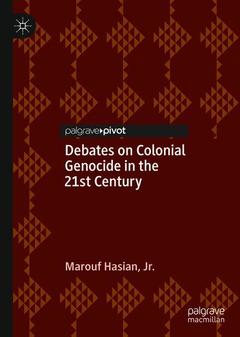Description
Debates on Colonial Genocide in the 21st Century, 1st ed. 2020
Author: Hasian Jr. Marouf
Language: English
Subject for Debates on Colonial Genocide in the 21st Century:
Approximative price 52.74 €
In Print (Delivery period: 15 days).
Add to cartSupport: Print on demand
Description
/li>Contents
/li>Biography
/li>Comment
/li>
This book analyses the debates on colonial genocide in the 21st century and introduces cases where states are reluctant to acknowledge genocides. The author departs from traditional studies of the work of Raphael Lemkin or U.N. definitions of genocide so that readers can examine genocide recognition as a political act that is bound up in partial perceptions and political motivations. The study looks at the Tasmanian genocide, Al-Nakba, and several other tragic events. It also looks at the ways that these historical and contemporary debates about colonial genocides are related to today?s conversations about apologies and other restorative justice acts. This work will be of interest to a wide range of audiences including researchers, scholars, graduate students, and policy makers in the fields of political history, genocide studies, and political science.
Marouf Hasian, Jr. is Professor of Communication at the University of Utah, USA.
Provides a detailed critical analysis of some of academic and journalistic debates on colonial genocide
Analyzes two major cases studies of genocide, the Tasmanian genocide and the Nakba
Presents the argument that all decision-makers and global denizens need to treat genocidal recognition as a rhetorical achievement




